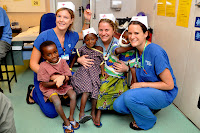On the ward everything we say to our patients, every question we have, must go through a translator. The translators are one of my favorite parts of my job, but the fact that they are there to translate is my least favorite part. I am constantly muttering under my breath: "I wish I could talk with these people." It's my new, useless, little mantra. Yes, I could study my French more, but lots of our patients don't speak French, they speak Ewe, or some other local dialect and their French isn't much better than mine. I went with a translator to speak to one of my patient's parents and after rattling on for awhile the translator said, "he doesn't understand my language." And we asked all our other translators and turns out there was nobody who speaks his language. Luckily, the patient, an eight year old, knew a little French.
We loose a lot of things in translation. For example, the boy I was looking after last night: with the help of one translator I learned that he pooped yesterday. I was suspicious after I felt his bloated belly, so I asked with another translator and found out he hadn't pooped for four days. "Defecate, bowel movement, 'caca' in French"... perhaps that would be a more practical thing for me to say over and over again. Enough poop already, I know, but let me just mention that one translator told me, "to poop" in French is "urine." I don't know much French, but I'm pretty sure that's not right.
But enough telling tales on my translators, I wanted to be saying what a joy they are. And although it's often quite frustrating to be a nurse when it takes a few hours to figure out if someone pooped lately or not, I am certainly not in a position to be criticizing people who have not yet mastered their third language. And they are definitely not getting paid the wages of a linguist. They are hard workers when they need to be, but they are best at smiling and laughing. They carry children to the bathroom; they pray with us; they hold patients hands when I have to poke them with needles; they sing songs to them and tell them not to hit their mothers.
It is a little sad to be in Africa but on a ship that feels like Europe. It makes me so happy to go down to the hospital and be surrounded by Africans. They are all so friendly; they will stand and shake your hand and smile and laugh with you, and they will talk with you whether or not any words are understood between you. We have translators and parents and patients all jammed into a few rooms -there are patients on beds and parents under beds and translators wherever they can fit between the nurses. And then sometimes the translators will find drums and the parents will pop out from under the beds and we will have a little dance party. By dance I mean the Africans will do finely controlled graceful things with their bodies while the Yovo's (white people) will flail about and inspire hysterical laughter. But laughter is like medicine -I actually learned that in nursing school- and the Africans take very well to laughter.
Here, words travel slowly and uncertainly between us, but a lot is said without them. I will ask my patient's parents: "any questions?" And surely, on this strange boat they have so many questions, but usually the response I get is, "I want to say thank you to you and to God." And it is good to hear, but I don't need a translator to understand that message -it is something I can see and feel, over and over, every time I go to work.























